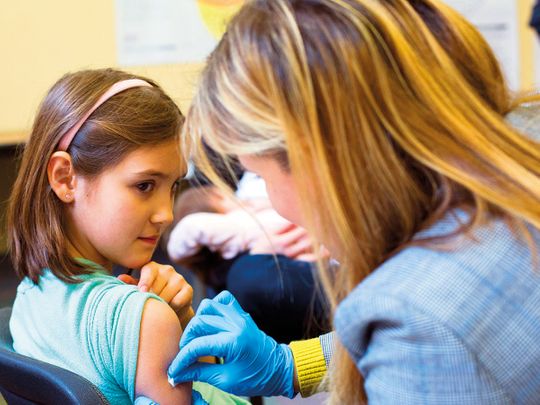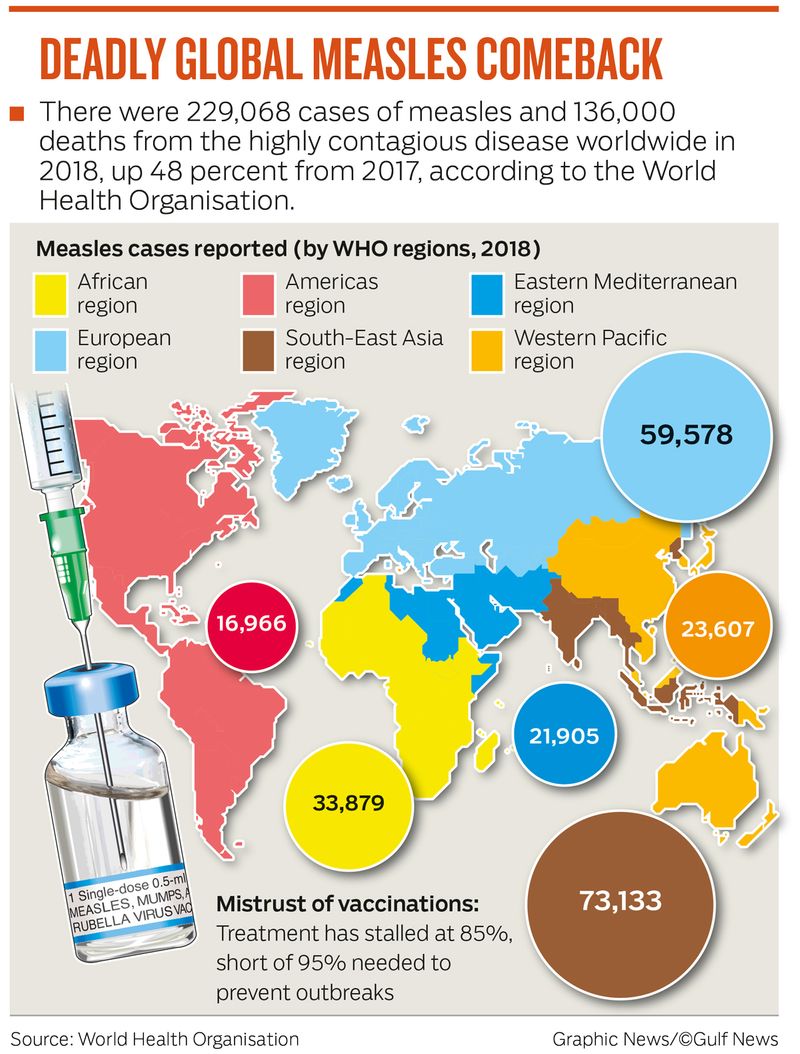
New York: For months, New York City officials have been fighting a measles outbreak in ultra-Orthodox Jewish communities in Brooklyn, knowing that the solution — the measles vaccine — was not reaching its target audience.
They tried education and outreach, working with rabbis and distributing thousands of flyers to encourage parents to vaccinate their children. They also tried harsher measures, like a ban on unvaccinated students from going to school.
But with measles cases still on the rise and an anti-vaccination movement spreading, city health officials on Tuesday took a more drastic step to stem one of the largest measles outbreaks in decades.
Mayor Bill de Blasio declared a public health emergency that would require unvaccinated individuals living in Williamsburg, Brooklyn, to receive the measles vaccine. The mayor said the city would issue violations and possibly fines of $1,000 for those who did not comply.
“This is the epicentre of a measles outbreak that is very, very troubling and must be dealt with immediately,” de Blasio said at a news conference in Williamsburg, adding: “The measles vaccine works. It is safe, it is effective, it is time-tested.”

The measure follows a spike in measles infections in New York City, where there have been 285 confirmed cases since the outbreak began in the fall; 21 of those cases led to hospitalisations, including five admissions to the intensive care unit.
City officials conceded that the earlier order in December, which banned unvaccinated students from attending schools in certain sections of Brooklyn, was not effective. De Blasio said Tuesday that the city would fine or even temporarily shut down yeshivas that did not abide by the measure.
“There has been some real progress in addressing the issue, but it’s just not working fast enough, and it was time to take a more muscular approach,” de Blasio said.
To enforce the order, health officials said they did not intend to perform random spot checks on students; instead, as new measles cases arose, officials would check the vaccination records of any individuals who were in contact with those infected.
If someone is fined but still refuses to be vaccinated, Barbot said that would be handled on a “case-by-case basis, and we’ll have to confer with our legal counsel.”
“The point here is not to fine people but to make it easier for them to get vaccinated,” Dr. Oxiris Barbot, the city’s health commissioner, said at the news conference.
Across the country, there have been 465 measles cases since the start of 2019, with 78 new cases in the past week alone, the Centres for Disease Control and Prevention said Monday.
In 2018, New York and New Jersey accounted for more than half of the measles cases in the country, and the continuing outbreak has led to unusual measures.
In Rockland County, New York, a northern suburb of New York City, county health officials last month barred unvaccinated children from public places for 30 days. Last week, however, a judge ruled against the order, temporarily halting it.
Despite the legal challenge to Rockland County’s efforts, de Blasio said the city had consulted its lawyers and felt confident it was within its power to mandate vaccinations.
“We are absolutely certain we have the power to do this,” de Blasio said. “This is a public health emergency.”
Dr. Paul Offit, a professor of paediatric infectious diseases at Children’s Hospital of Philadelphia, said there was precedent for de Blasio’s actions, pointing to a massive measles outbreak in Philadelphia in 1991. During that outbreak, officials in that city went even further, getting a court order to force parents to vaccinate their children.
“I think he’s doing the right thing,” Offit said about de Blasio. “He’s trying to protect the children and the people of the city.”
He added: “I don’t think it’s your unalienable right as a United States citizen to allow your child to catch and transmit a potentially fatal infection.”
Nonetheless, the resistance to the measles vaccine remains among some ultra-Orthodox in Brooklyn.
Gary Schlesinger, chief executive of Parcare, a health and medical centre with locations in Williamsburg and Borough Park, called the public health emergency a necessary “step in the right direction.”
“Any mother that comes in and says that they don’t want to vaccinate, our providers will tell them please go find another health centre,” Schlesinger said.
He said he often reminded Orthodox parents that there was no religious objection to getting vaccinated. “Any prominent rabbi will say that you should vaccinate,” he said.
Just outside the public library where de Blasio held his news conference, some Hasidic mothers raised concerns about the emergency declaration.
“I don’t think it’s up to the city to mandate anything. We all have constitutional rights,” said a woman who only identified herself by Gitty. She refused to give her last name for fear of being harassed for her rejection of vaccinations.
She said she had five children and that none had been or would be vaccinated, an action she called “a medical procedure by force.”
“We are marginalised,” she said. “Every minority that has a different opinion is marginalised.”
In nearby South Williamsburg, reaction to the emergency order was mixed. Some agreed with the need for vaccinations but did not believe the law should require them; others agreed with the mayor.
“He’s right,” said Leo Yesfriedman, a 33-year-old father of four who said he had his family vaccinated.
He said he had followed news of the measles outbreak. Of people in his community opposed to vaccinations, he said, “It’s a very, very little percentage of crazy people.”








